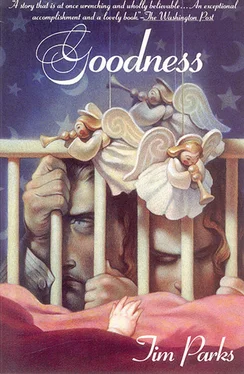House or no house, the advantage of the fire is that I would not need to be in the same room as her. I would not have to see her clawing for breath.
But what decides me in the end is Peggy’s abortion. We have been seeing Peggy and Charles regularly for a couple of years now. Really, they are our only visitors. Shirley did go through a period of trying to contact and make friends with other couples with handicapped children, and we would drive out to meet them some evenings or Saturday afternoons. One does these things, looking for reassurance, I suppose, others in the same boat. But it was too depressing. One’s own handicapped child is bad enough, but the deformities and spastic contortions of a stockbroker’s boy in Walthamstow, a railway worker’s teenage daughter in Hounslow are too appalling. And far, far from reassuring. Merely a reminder in fact of how lost and wave-tossed the shared boat is. Somehow the more these people insisted on the little progresses, the tiny achievements of their doomed offspring, the more obstinately cheerful they were, showing you family photos in fields of flowers, so the worse, at least for me, the whole scenario became. Until, with the reasonable excuse that we were only depressing ourselves, I managed to put an end to this interlude. Shirley offered no resistance. She is not quite at my mother’s level of martyrdom yet. In fact we will have these moments, sitting on the sofa for example, watching the box, when our fingers will meet, involuntarily it seems, and some kind of communication, of affection will pass between us.
We haven’t made love for more than five years.
Shirley has confiscated and burnt my euthanasia scrapbook. Though I don’t generally go in for hocus pocus, I find the fact that she burnt it excitingly symbolic. Anyway, I shan’t be collecting any more such articles now. I sense the need for them is over.
Although never exactly assiduous, all our old regular friends, Gregory and Jill and Shirley’s one-time school colleagues, have completely dropped off. They find it too hard to handle. Shirley has her church friends of course, but she generally sees them in the morning or afternoon when I’m at work, or at Wednesday evening choir practice or after Sunday Morning Service. So our paths don’t cross. Anyway I have no desire to see them. Their determined niceness grates on me, reminds me of Mother humming ‘Count your blessings’, under an umbrella on Park Royal Road with an empty purse in her threadbare pocket. There is a primal anguish behind it all for me, dating back I sometimes wonder, to some experience I can’t even remember. I dream my dreams of mutilation.
But we do see Charles and Peggy. They come over once, twice, even three times a week, eat with us, talk, argue. They always come together because they are sharing a house he has persuaded his buddies in Camden Council Housing Authority to let Peggy have, pending demolition. This is a wangle I’m sure. They’ve had the place more than a year now and there’s no sign of the bulldozers. Meanwhile, God knows in what investments Charles has sunk the hundred and fifty-odd grand he got from Daddy-oh. In British Airports, I wouldn’t be surprised. Nothing would surprise me.
I didn’t realise they were lovers at first. Why? Because Peggy has always enthused over her lovers, always pronounced herself everlastingly in love with them. Because, being our brother and sister, they have a good excuse for arriving together. Because Charles never shows a shred of fatherliness toward the exhaustingly exuberant Freddie. And because I always suspected he was queer.
‘Peggy mentioned it,’ Shirley tells me one day.
‘Mentioned it!’
‘She was very offhand.’
‘Wonders will never cease.’
‘I was thinking, probably that’s why he became so assiduous about visiting us in the first place. To see her.’
I reflect on this.
‘They don’t show any affection together. Why don’t they act like a couple?’
‘The amazing thing about you,’ Shirley says, ‘is that for all your super logic and supposed modernity, you’re so incredibly traditional.’
‘Sorry, I just thought it was common sense. You’re lovers, you live together, you may as well act like a couple.’
‘Why don’t you just accept that people are different. You got angry with her when she was naïve, now maybe she’s being less so.’
But although in some obscure way I disapprove of Charles and Peggy, I do enjoy their visits. Discussing things between four people they seem manageable, whereas on one’s own, or alone with Shirley, hysteria is always just around the corner.
‘Now the girl’s five,’ Charles tells us this evening, ‘you’re due for nappy relief, since a normal child would now be out of nappies.’
‘Oh yes?’ Shirley asks chattily. ‘What do we have to do?’
Charles begins to describe the bureaucratic procedure. He obviously enjoys this. His voice is quick, incisive, very faintly patronising in a teacherly sort of way. As he speaks, lean and sinewy, I watch how his thin fingers twine and untwine around a tumbler. His Adam’s apple is also jerkily mobile.
‘A wonder they haven’t cut it,’ Peggy remarks. She is helping Frederick with a jigsaw puzzle of the Changing of the Guard.
‘No, there’s no actual means test per se ,’ Charles reassures. ‘More to the point they need a letter from your GP to the effect that the child really is incontinent.’
‘Fair enough. After all, they’re eight quid a box,’ Shirley says, ‘and it’s only paper and a bit of plastic in the end.’
‘You know you can’t use them at all in Washington State,’ Peggy informs. ‘Anti-ecological.’
‘Then you present proof of purchase and you get the cash.’
I remark that eight quid, what, a week, isn’t going to change our lives in any major way, is it? It hardly seems worth the time in the queue. In fact — and I make the mistake of getting drawn into an old argument — the whole point about state help, or any such sops of this kind, is that they merely draw your attention away from the real issue while you waste your time picking up crumbs.
‘And what is the real issue?’ Charles asks sharply.
‘That this is our problem. Our huge problem, and we’re stuck with it. There is no imaginable help that could really amount to anything or significantly change our lives.’
‘Well, obviously it’s useful for the less well-off,’ Charles says, faintly offended by my lack of interest, ‘which is why the government’s no doubt trying to cut it.’
‘But we’re not less well off, we’re rich. I’m on forty-plus grand. If I don’t pick it up there’ll be more for someone else.’
‘No, if people don’t pick it up, the government’ll say they don’t need it and remove it all together.’
Looking away from me to inspect a ladder on dark tights, Shirley says: ‘George is just lamenting the absence of state assisted abortion post birth.’ She looks up with her little smile. ‘ N’est-ce-pas ?’
I shrug my shoulders. We’re old campaigners now. I don’t think either of us is capable of shocking the other any more. ‘Abortion certainly solves a problem in a way a few quid for nappies doesn’t.’
Then before Charles can stop her, Peggy says simply: ‘I’m going to have to have an abortion. Next week.’ And very matter of fact, she explains that she is pregnant by Charles (he fidgets fiercely, pushes thumb and forefinger around his teeth), but that he doesn’t want the child. Anyway, she already has Freddy and that’s quite enough for anyone the way men come and go. She doesn’t seem to be saying this as an attack on Charles, or even as an expression of reproach.
Why am I so stunned? It is the ease with which my sister handles these decisions, the lack of any hint of guilt.
Читать дальше












